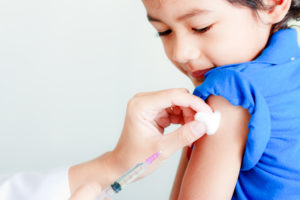February 08, 2017 | Black & Kletz Allergy

In cases of an anaphylactic reaction (a severe life-threating reaction involving multiple organ systems) to a vaccine, further evaluation should be undertaken by an allergist in an attempt to identify the culprit allergen. These types of reactions are more often caused by additives (e.g., preservatives) or residual vaccine components, such as gelatin, rather than the microbial immunizing agent itself.
Patients who experience an apparent anaphylactic reaction should undergo immediate-type allergy skin testing to confirm that the reactions were mediated by an IgE antibody and to determine the responsible component of the vaccine. If the skin tests are negative, the chance that the patient has IgE antibodies to any vaccine component are negligible, and the vaccine can usually be administered under physician supervision with epinephrine and other medications readily available. If the skin tests are positive and suggestive of an IgE-mediated reaction, consideration may be given to administer all future doses in a graded fashion under close physician monitoring.
Pregnant women should not receive live vaccines. They can however be given inactivated influenza (i.e., “the flu”), tetanus, and hepatitis B vaccines, if approved by their Obstetrician. Live vaccines should also not be given to persons with immune system defects and/or function because of a risk of it resulting in a generalized infection with that immunizing agent or vaccine.
Certain vaccinations (e.g., MMR) and/or the preservatives used in some vaccines (e.g., thimerosal) have been purported to have long-term consequences such as autism. Other vaccines (e.g., hepatitis B, influenza, tetanus) have been alleged to cause or aggravate multiple sclerosis. Epidemiological studies have not supported such associations at this time, so it is probably safe to say that it is very unlikely that the MMR vaccine or thimerosal causes autism. Likewise it is also fair to say that at this time in is very unlikely that the hepatitis B vaccine causes multiple sclerosis or that the hepatitis B, influenza, and/or tetanus vaccines worsen a patient’s multiple sclerosis. It is however very important to discuss such apprehensions with your physician before receiving a vaccination, as you are your best advocate.
Individuals with a history of a suspected egg allergy should be evaluated by an allergist to determine the status of their egg allergy. Most people, even with confirmed egg allergy, should receive influenza vaccinations because the risks of vaccinating are generally outweighed by the risks of not vaccinating. Skin testing with the influenza vaccine is no longer recommended in people with a history of an allergic reaction to eggs.
Patients with egg allergy with a history of only hives after egg ingestion can receive the influenza vaccine in a primary care provider’s office provided the appropriate personnel and equipment are available, whereas those with a history of more severe reactions to egg ingestion should receive their vaccine in an allergist’s office.
In patients with a history of an allergic reaction to the influenza vaccine itself, additional evaluation is appropriate including skin testing with the vaccine and vaccine ingredients. For patients with positive skin test results, the vaccine can either be administered in multiple divided doses (i.e., desensitization) or it can be withheld.
The board certified allergists at Black & Kletz Allergy have 3 convenient locations in the greater Washington, DC, Northern Virginia, and Maryland metropolitan area. We welcome any and all questions regarding vaccines including their possible benefits and the potential untoward reactions. Black & Kletz Allergy diagnose and treat both adults and children and have had more than 50 years of experience dealing with the subject of vaccinations. We test, administer, and desensitize patients to many kinds of vaccinations depending upon the type of vaccination and their need to receive the inoculation. Black & Kletz Allergy has offices in Washington, DC, McLean, VA (Tysons Corner, VA), and Manassas, VA, each with on-site parking. The Washington, DC and McLean, VA offices are Metro accessible and we offer a free shuttle that runs between our McLean office and the Spring Hill metro station on the silver line. Please call us to make an appointment for any of your allergy, asthma, and immunology needs or alternatively, you can click Request an Appointment and we will respond back to you within 24 hours of the next business day. The allergy doctors at Black & Kletz Allergy are happy to assist you by providing high quality allergy care in a professional and friendly environment.












